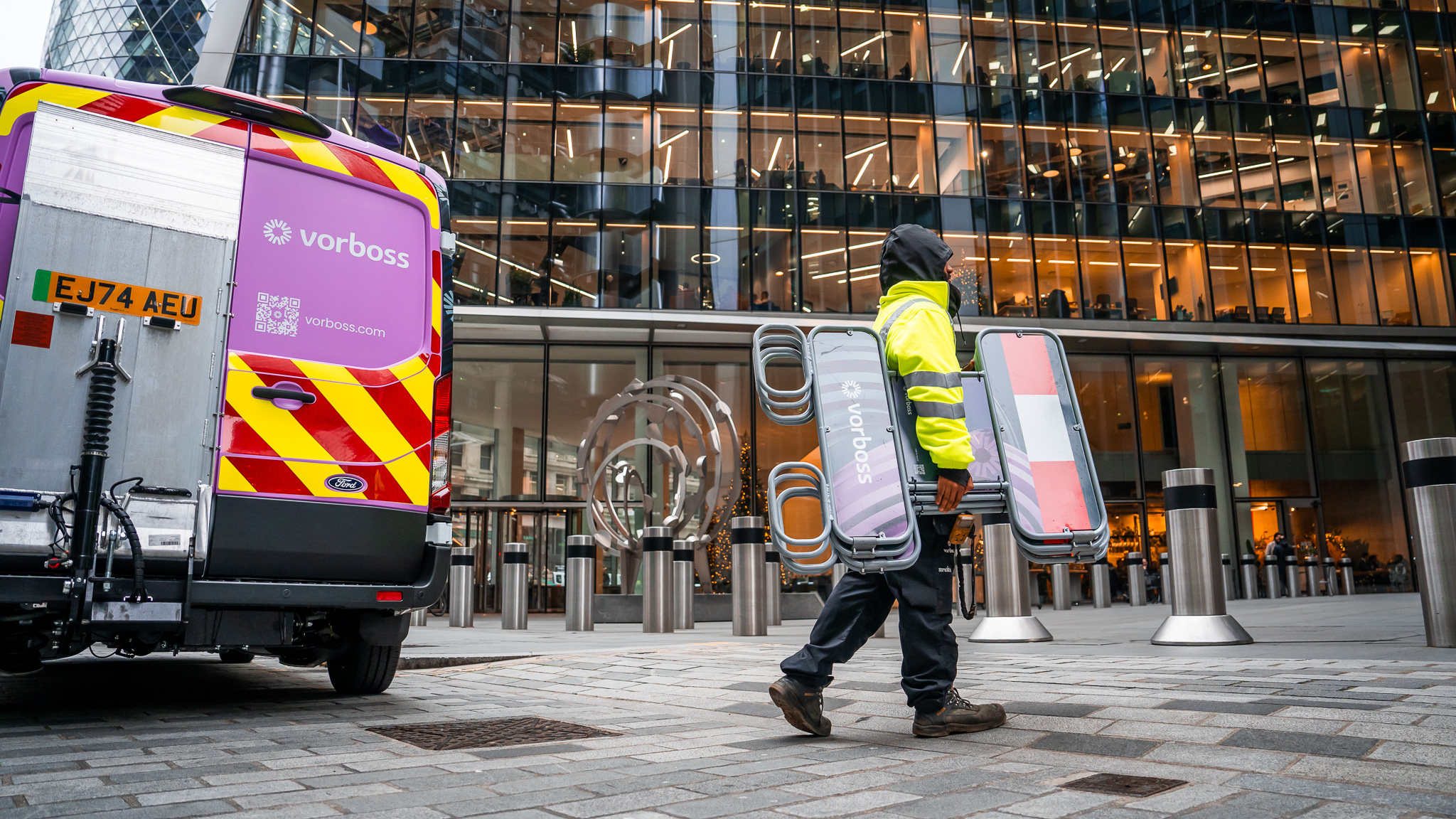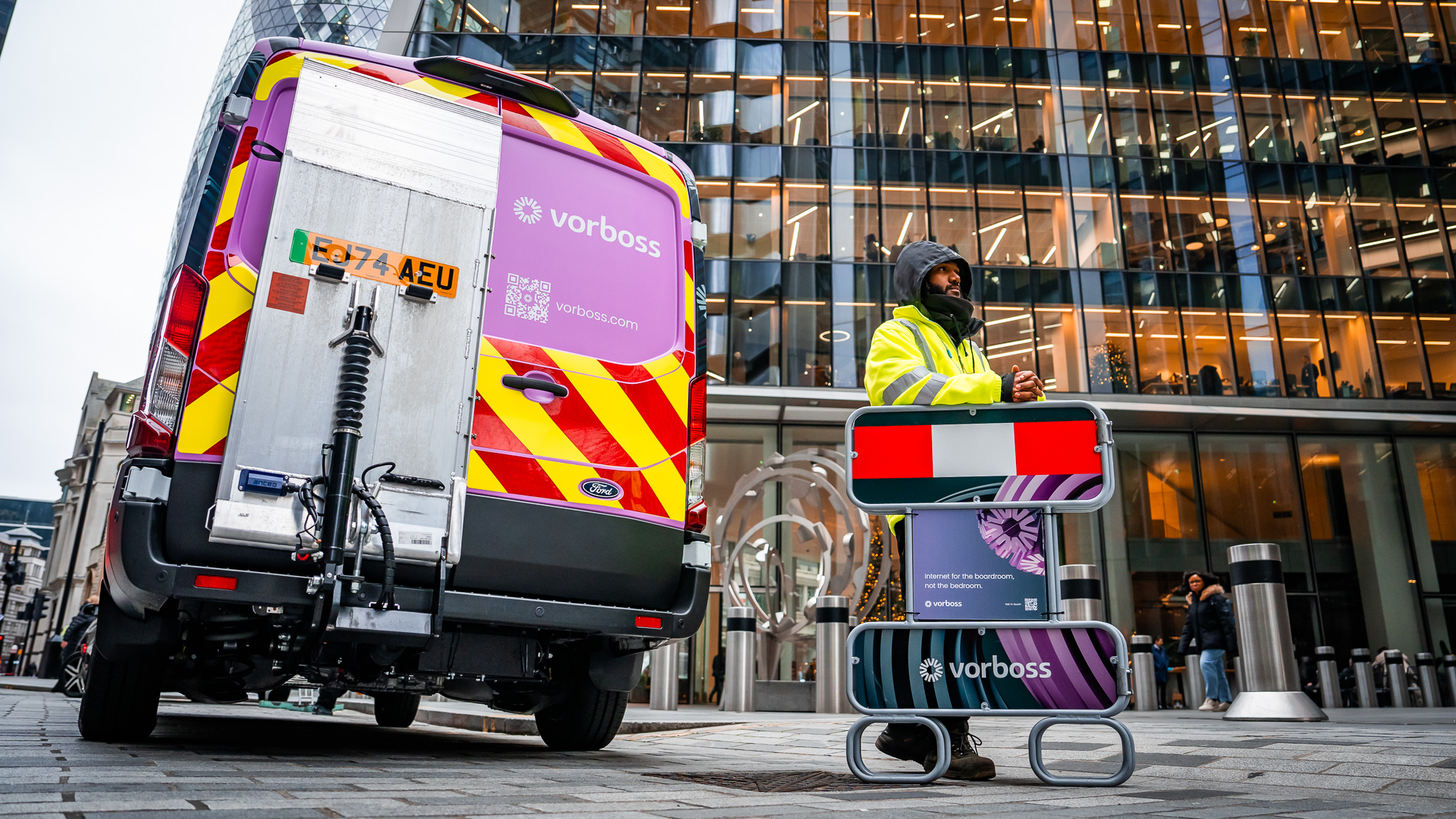Vorboss named Best Network Provider at the 2025 Comms National Awards


It feels like we learn about a new cyberattack every other day. We see it in the news, we hear about it from colleagues, and it’s coming up more often in conversations with customers and insurers. As a result, businesses are under growing pressure to “do more” around cybersecurity.
For many, the difficulty isn’t willingness. It’s not having clear visibility into where the gaps are, and what to focus on first. And that’s completely normal, many businesses are in that same position, especially without dedicated security expertise in-house.

That usually leads to the same questions:
- “Where do we even begin?”
- “What risks don’t we know about yet?”
- “Are we focusing on the right things?”
- “Would we spot an attack in time?”
- “What happens if we’re taken offline?”
Wherever you are today, this blog helps clarify which step makes sense for you.
1. “Where do we start?”
If you’re at the very beginning of strengthening your cybersecurity, or you’re looking to understand how well your business is protected, a cyber health check is a great starting point.
It’s a comprehensive audit that assesses your security across technology, people, and processes, and shows you strengths, risks and areas for improvement. All benchmarked against industry frameworks such as NCSC Top 10, CSF and CIS.
A health check is particularly valuable if you need to:
- Decide where security investment will have the most impact
- See how your current measures align with recognised best-practice standards
- Provide leadership, boards, or investors with recommendations to support informed security decisions
2. “Is what we’ve put in place actually working?”
Once you’ve started putting protections in place, the next question is often about reassurance.
Penetration testing helps answer that. It puts your existing security to the test, using accredited specialists who look at your systems the way a real attacker would. The goal isn’t to catch you out, but to show what’s holding up well and where weaknesses still exist.
You’re given a clear, prioritised set of actions you can actually act on, helping you strengthen what’s already there and provide reassurance to customers or partners who want confidence in how you protect your business.
This is essential for businesses that:
- Need evidence of testing for customer, partner, insurer, investor, or board requirements
- Are looking for independent assurance
- Run customer-facing or revenue-critical platforms
Important to note: Penetration testing is often seen as the starting point for cybersecurity, but in reality, it works best after you’ve put some basic protections in place. Without that foundation, a test will usually confirm obvious gaps rather than help you move forward, making it a poor use of time and budget.
3. “Have we got the basics covered?”
The reality is that good IT hygiene is one of the strongest defences most businesses have.
Many cyberattacks don’t rely on advanced techniques. They exploit weaknesses that already have fixes available, but were never applied.
Vulnerability and patch management focuses on keeping those basics covered, by continuously scanning for issues and applying updates automatically across your environment.
This helps you:
- Reduce the risk of exploitation by fixing known weaknesses quickly
- Ensure updates are applied across laptops, cloud systems, and firewalls
- Remove the day-to-day burden from your internal IT team
4. “Would we be able to detect an attack?”
Many attacks aren’t obvious. They often happen outside working hours and blend into normal activity. Without continuous monitoring, most businesses only discover an issue after damage has already been done.
A security operations centre, known in cybersecurity as a SOC, acts as your external security team. Real people monitor your systems around the clock, investigate unusual activity as it happens, and step in as soon as something looks suspicious.
It’s great for businesses that:
- Don’t have an in-house cybersecurity team
- Want peace of mind that their systems are always being watched
- Need protection beyond the basics
- Want confidence that attacks won’t be missed
5. “What happens if we’re taken offline?”
DDoS attacks are one of the most common causes of disruption for online businesses. If your business relies on online platforms such as e-commerce sites or client portals, staying online is critical.
DDoS protection filters malicious traffic before it reaches your systems, keeping services available during an attack and protecting your customers, operations, and reputation. It’s a simple, cost-effective way to reduce the risk of being taken offline.
Still not sure which solution is right for your business?
We’re here to meet you wherever you’re at. Our in-house team runs these services directly and works with you to advise on the right protection for your business, now and as it changes.


We’re delighted to have been named Best Network Provider at the 2025 Comms National Awards!
With over 200 entries from across the UK, the competition was fierce, which makes this win feel extra special.
What the award recognises
The Best Network Provider category recognises network providers delivering standout connectivity services, with a focus on quality of delivery and innovation.
The awards celebrate some of the strongest providers in the industry. Being recognised alongside these teams reflects years of investment and a relentless focus on network reliability, service and support.
Owning the network changes the game
The UK continues to lag behind much of Europe when it comes to fibre connectivity. For businesses, that often means slow speeds, unreliable calls and networks that struggle to keep up with modern ways of working. Many businesses are still relying on services built on legacy infrastructure, where multiple providers ultimately depend on the same underlying network.
The result is complexity, inconsistent pricing, slow installs and service that feels disconnected from modern business needs.
We knew there was a better way.
So, we built a dedicated 100Gbps capable London business fibre network, designed for speed, resilience and scale. We run and manage the process end-to-end, from site routing and surveys through to network operations and cybersecurity services, giving businesses one accountable provider for all their connectivity needs.
What this means for our customers
This award reflects a service that works the way modern businesses need it to.
Owning our network end-to-end gives us full control over delivery and operations. It means greater flexibility, higher standards throughout the customer journey, and clear accountability from day one, so you can focus on running your business.
Congratulations to all the winners, finalists and teams involved, and thank you to Comms Dealer, the judges and sponsors for putting on such a great night.
About Vorboss
Vorboss is powering London with the technology to thrive. Its detailed understanding of the London landscape supports how modern teams operate. Vorboss specialises in dedicated fibre connectivity, network management and cybersecurity, all run end to end on its own Central London network.
That means high-quality service, fair pricing and simplified delivery through a single accountable provider. No chasing, no excuses and no delays.
Meet Vorboss at Channel Live
Learn more about London’s only dedicated fibre network for businesses and our newly launched 2Gbps product.


Alaco is a global business intelligence firm, trusted by financial institutions, multinationals, law firms, and family offices to manage risk, resolve disputes, and protect reputations.
Just two weeks before moving into their new London HQ, wayleave complications threatened to delay their internet connection. Their legacy provider estimated it could take over three months to get them online, putting the launch day at serious risk.
Keeping launch day on track
Thoughts of a delayed launch day crept in, and the team quickly began exploring alternatives. One of our channel partners, Onsite Technologies, introduced Alaco to us. Having worked with us before, Onsite knew we could expedite the delivery and keep the launch day on track. With our fibre network already close by, we were perfectly positioned to step in and take over the process – something we do for customers on a tight deadline.
Taking over the wayleave process
From the moment we were introduced, the Vorboss team moved fast. Within three working days, our engineers had completed the site survey, and our in-house wayleaves team was engaged straight away so the customer didn’t have to worry about it.
Because everything’s managed by us in-house, we were able to prioritise the approval as urgent. The night before installation, our team were still on the phone, coordinating directly with the solicitor and the customer to make sure everything stayed on track. The wayleave was finalised and signed the morning of the install, and the connection went live as planned.
For a business already under pressure, that support made a real difference.
Andy Simpson-Pirie, CTO said:
“There was real relief knowing Vorboss would take care of everything in-house and liaise directly with the necessary stakeholders.”
.png)

In this special edition of our Leading London series, we were joined by the tech leaders involved in the City of London Corporation’s network transformation to discuss one of the UK’s most ambitious digital projects and what other authorities can take from the work.
The session was hosted by Christa Elizabeth Norton, Roc Technologies, and featured:
- Sam Collins, Assistant Director of Digital and Data, City of London Corporation
- Chelsea Chamberlain, Chief Technology Officer, Roc Technologies
- Scott McKinnon, Chief Security Officer, Palo Alto Networks
- Elliot Townsend, Senior Director, HPE Networks
- Rhod Morgan, Chief Operating Officer, Vorboss
Together, we explored the solution behind the new unified network and what it will mean for public sector teams, frontline services and the communities that rely on them.
Why the City needed a new network
Sam, who’s heading the Future Network Programme explained that changes in how people work and interact with public services meant the City’s existing network could no longer keep pace.
The MPLS network installed in 2017 was fit for purpose at the time, but the rapid shift to cloud services, video collaboration, mobile working and the growing role of AI changed the demands placed on the network. As Sam explained, this prompted the City to set out one of the most ambitious network transformation programmes in UK local government.
The City’s estate is uniquely diverse, spanning the City of London Corporation, the City of London Police and council services. These teams support critical services across the Square Mile and beyond. That meant the new network had to be designed for modern public service delivery from the outset.
Sam was clear that the new solution needed to be cloud-first, with security built in rather than bolted on, enabling staff to work effectively whether they were in an office, moving between sites or working remotely. It had to be a modern, scalable and secure network.
This ambition was directly linked to the City’s wider direction. The Town Clerk, Ian Thomas, has set out a plan for the organisation to operate as a world-class authority. As Sam made clear, delivering that vision depends on world-class technology, supported by a network built for the future.

Bringing the City’s vision to life
Delivering a project of this complexity required close collaboration across teams and partners, with a shared focus on getting the foundations right.
As the corporation’s chosen managed service provider, Roc Technologies worked closely with the team to design a solution capable of supporting both current needs and long-term ambitions. Chelsea, Roc CTO explained that their work began with understanding what future networking looks like across the estates, from campus environments to local government services, and stressed that everything depends on the quality of the underlying connectivity.
“Your networking connectivity provides the foundation layer upon which you can build AI capability, machine learning capability, and exceptional user experience for all parts of your business.”
Chelsea added that user experience and future readiness were central to the design. The City’s ambition, combined with partners aligned around the same goals, is enabling a step change in local government networking approach.
Security for a modern public service
This is going to be the first end-to-end SASE (Secure Access Service Edge) deployment in the UK public sector. Scott McKinnon explained that SASE delivers security from the cloud, enforcing access controls and inspecting traffic as users connect to applications across the internet, SaaS platforms and the cloud. Instead of relying on protection tied to a single site or traditional firewall boundaries, it gives people secure access wherever they are.
“You can give users fast and immediate access to the services they need wherever they are, while providing security on a continuous basis.”
SASE reduces the burden of managing separate security tools and gives digital teams clearer visibility across the City’s estate. Palo Alto Networks was chosen for this part of the solution because of their commitment to data sovereignty and a forward-thinking roadmap towards a full SASE architecture, rather than reliance on legacy firewall infrastructure.

For many landlords and building managers, the word “wayleave” feels like the responsible route whenever a fibre circuit is being installed on their property. It sounds formal and safe – a neat legal box to tick.
In many cases, however, a wayleave adds unnecessary complexity and delays, frustrates tenants, and can expose landlords to long-term legal risks.
At Vorboss, we’ve connected thousands of office spaces across London without a wayleave, keeping landlords in full control and getting tenants online faster.

What is a wayleave?
A wayleave is a written agreement between a landowner and a telecoms operator. It gives the operator permission to install and keep equipment on private property.
What many people don’t realise is that signing a wayleave also activates “Code rights” under the Electronic Communications Code. These rights go beyond simple permission, they give the operator legal powers to stay on the property indefinitely, access it when needed, and even refuse removal of their equipment in certain situations.
For a typical connection into a commercial building in London, a wayleave can make the fibre installation process slower, more expensive, and limit the landlord’s flexibility long term.
Why a wayleave isn’t required for standard in-building fibre connections
For a standard in-building fibre connection serving a tenant, a wayleave isn’t a legal requirement. Important protections, like building access, fire safety, repairing any damage, and removing equipment, are already covered by the tenant’s lease and usual building rules.
If no wayleave is signed, no Code rights are triggered, meaning the landlord retains full control and the installation exists under a simple, fully revocable licence.
In practice, this gives landlords far more protection and flexibility:
- No legal lock-in – the telecoms operator has no long-term rights to stay or refuse removal.
- Landlords keep full control – equipment can be moved or removed when the building changes.
- Faster fibre installation – no time lost in drafting contracts or solicitor reviews.
- Happier tenants – connections go live quicker; tenants get to move in faster.
By contrast, signing a wayleave and granting Code rights introduces a complex and expensive legal process for any fibre removal or relocation. This can take at least 18 months, plus potential court or tribunal proceedings, making it slower, and far less flexible for the landlord.
.png)
This special edition of our Leading London series brings together the partners behind the rollout of the City of London Corporation’s new unified network, a major upgrade designed to strengthen public services and improve connectivity across the Square Mile and beyond.
The panel included:
- Sam Collins, Assistant Director of Digital and Data, City of London Corporation
- Chelsea Chamberlin, Chief Technology Officer, Roc Technologies
- Scott McKinnon, Chief Security Officer, Palo Alto Networks
- Rhod Morgan, Chief Operations Officer, Vorboss
- Elliot Townsend, Senior Director, Juniper Networks
- Christa Elizabeth Norton, Marketing Director, Roc Technologies
Together, they explored how the new network will improve public services, strengthen cyber resilience and support a more connected, future-ready City.
Latest from the press room


We’re delighted to have been named Best Network Provider at the 2025 Comms National Awards!
With over 200 entries from across the UK, the competition was fierce, which makes this win feel extra special.
What the award recognises
The Best Network Provider category recognises network providers delivering standout connectivity services, with a focus on quality of delivery and innovation.
The awards celebrate some of the strongest providers in the industry. Being recognised alongside these teams reflects years of investment and a relentless focus on network reliability, service and support.
Owning the network changes the game
The UK continues to lag behind much of Europe when it comes to fibre connectivity. For businesses, that often means slow speeds, unreliable calls and networks that struggle to keep up with modern ways of working. Many businesses are still relying on services built on legacy infrastructure, where multiple providers ultimately depend on the same underlying network.
The result is complexity, inconsistent pricing, slow installs and service that feels disconnected from modern business needs.
We knew there was a better way.
So, we built a dedicated 100Gbps capable London business fibre network, designed for speed, resilience and scale. We run and manage the process end-to-end, from site routing and surveys through to network operations and cybersecurity services, giving businesses one accountable provider for all their connectivity needs.
What this means for our customers
This award reflects a service that works the way modern businesses need it to.
Owning our network end-to-end gives us full control over delivery and operations. It means greater flexibility, higher standards throughout the customer journey, and clear accountability from day one, so you can focus on running your business.
Congratulations to all the winners, finalists and teams involved, and thank you to Comms Dealer, the judges and sponsors for putting on such a great night.
About Vorboss
Vorboss is powering London with the technology to thrive. Its detailed understanding of the London landscape supports how modern teams operate. Vorboss specialises in dedicated fibre connectivity, network management and cybersecurity, all run end to end on its own Central London network.
That means high-quality service, fair pricing and simplified delivery through a single accountable provider. No chasing, no excuses and no delays.
Meet Vorboss at Channel Live
Learn more about London’s only dedicated fibre network for businesses and our newly launched 2Gbps product.

London, 5 November 2025
Vorboss, London’s leading business fibre network, today announces the launch of a cutting-edge connectivity product built to enable essential public services across the capital.
The new solution offers high-speed, reliable connectivity that’s both affordable and quick to deploy, helping London stay connected and future-proof.
Built on the 100Gbps-capable Vorboss network, the new solution delivers ultra-reliable, high-capacity connectivity that underpins the growing demands of smart city technology and public infrastructure.
With a range of options to connect these end-points, the product enables councils, transport authorities, and service integrators to easily connect and manage thousands of devices, from real-time traffic cameras, CCTV, small cells, and environmental sensors to IoT-connected street furniture, all with enterprise-grade resilience and low latency.
“We have been listening to local government organisations over the last year as they explain their difficulty in finding cost-effective, reliable solutions to connecting machines across their boroughs. Through a lot of consultation and innovation we have been able to create a fibre-based solution that is reliable and can be installed quickly.”
Jason O'Malley, CCO, Vorboss, notes:
“With this launch, we’re extending the power of the Vorboss network to enable local authorities and service providers to make cities safer, and more efficient.”

Vorboss’s fibre network, which spans over 700km, is engineered for scalability and security. Our engineers are all based in Central London and are managed by a Liverpool Street based planning and NOC team. This provides an unparalleled level of proactive and reactive support to London's councils.
Rhod Morgan, Vorboss COO, adds:
"The density and quality of our network in central London puts us in a unique position to provide these innovative solutions. Every month 100s of new businesses are being connected to the Vorboss network and this is natural progression of the business as we further accelerate this growth."
About Vorboss
Vorboss is London’s most advanced business fibre network, designed to meet the connectivity needs of modern enterprises and critical public infrastructure. As a member of the Fern Trading Group (part of Octopus Investments), Vorboss is focused on empowering organisations with direct, high-capacity fibre that supports innovation and growth.
.avif)

.avif)

